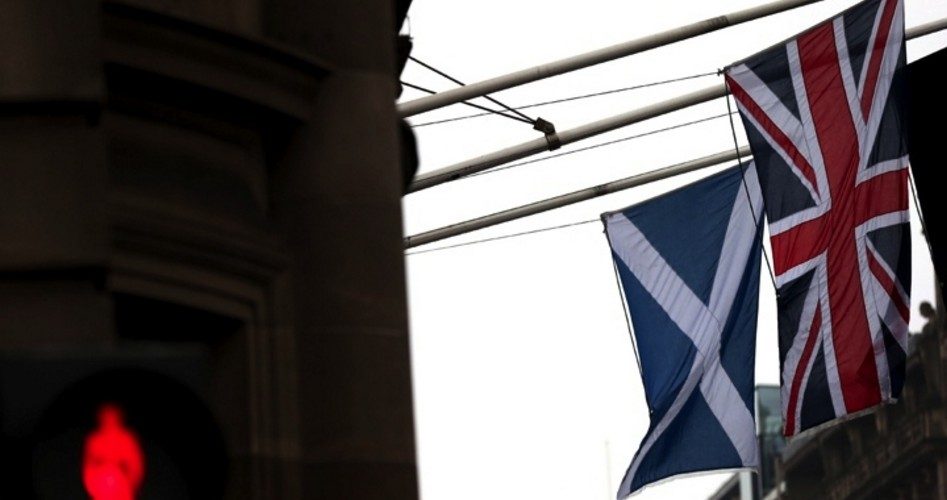
The polls in Scotland hadn’t been closed for more than an hour or two before the outcome of the independence vote was clear. By the time all the votes were tallied, 1.6 million Scots voted for independence while two million voted to stay in the United Kingdom. The massive turnout represented a remarkable 85 percent of all registered voters in Scotland, and the outcome prevented, for the time being anyway, the end of Scotland’s 307-year union with England.
Polls testing the waters just days before the election revealed a contest too close to call. The single question on the ballot, “Should Scotland to be an independent country?” could only be answered “yes” or “no,” and polls measuring the number of those voters planning to vote “no” slightly outnumbered those planning to vote “yes.” It wasn’t until the heads of the three major political parties in Westminster published a last-minute bribe on Tuesday that the fate of those favoring independence was sealed. Prime Minister David Cameron of the Conservatives, Ed Miliband of the Labour Party, and Nick Clegg of the Liberal Democrats signed an open letter published in the British tabloid the Daily Record.
Titled “The Vow,” the letter stated,
The people of Scotland want to know that all three main parties will deliver change for Scotland.
We are agreed that: The Scottish Parliament’s permanent and extensive new powers for the parliament will be delivered by the process and to the timetable agreed and announced by our three parties, starting on September 19…. We can state categorically that the final say on how much is spent on the NHS [Scotland’s National Health Service] will be a matter for the Scottish Parliament.
One of the three guarantees provided by these leaders included “the guarantee that with the continued Barnett allocation, based on need and with the power to raise its own funds, the final decisions on spending on public services in Scotland, including on the NHS, will be made by the Scottish Parliament.”
Under the Barnett allocation, all taxes raised in Scotland are paid into Westminster’s coffers and then doled out to England, Scotland, Wales, and Ireland, depending on need and political influence. At present, Edinburgh can direct 60 percent of its budget, but has extremely limited powers to raise revenue either through taxes or borrowing. Consequently, Scotland at present is heavily dependent upon British largesse for its funding.
Whether the three leaders will be able to keep their promise remains to be seen. In October, a memorandum of intent will be published, followed by preliminary legislation in December. The final bill will be voted on early next year.
At first blush, one primary winner appears to be Prime Minister David Cameron, who can keep his job. If Scotland had claimed its independence, Cameron’s job clearly would have been in jeopardy. Another winner is Alex Salmond, Scotland’s First Minister, who can take claim for wresting these powers from Westminster even as his campaign for independence failed. Salmond was also relieved of having to perform on his own set of promises, including a revived economy using revenues from Scotland’s vast oil and natural gas reserves. It also assures some 30 Scottish Members of Parliament in the Labour Party that they will keep their jobs.
With 1.6 million Scots voting for independence, the result, according to the Associated Press, “sets up a whole new political dynamic in the kingdom.” By receiving those greater powers to rule itself, Edinburgh, and Scotland itself, will lend great credence and credibility to secessionist movements all across Europe. As Pat Buchanan noted,
Cheering for the breakup of the UK are Catalans and Basques, Bretons and Corsicans, Tyroleans, Venetians, Flemish, all dreaming of nations of their own carved out of Spain, France, Italy and Belgium.
Europe’s secessionists have waxed ever stronger since the last decade of the 20th century when the Soviet Union and Yugoslavia splintered into 22 nations and Czechoslovakia broke in two….
The decomposition of the nations of old Europe is the triumph of tribalism over trans-nationalism. The heart has reasons that the mind knows not, said Pascal. And the wild heart is winning….
Secessionism is ablaze all over the world.
So in a way, with Salmond’s loss, the push for decentralization gained a victory. In the short run, little will change in the United Kingdom. In the long run, the secessionist movement gained immensely. With 1.6 million Scots voting for independence, the European Union’s continuing attempts to turn its economic bloc into a political one suffered a body blow. In the freedom fight, yesterday was a very good day.
Photo of Scottish and U.K. flags hanging in Edinburgh, Scotland: AP Images
A graduate of Cornell University and a former investment advisor, Bob is a regular contributor to The New American magazine and blogs frequently at www.LightFromTheRight.com, primarily on economics and politics. He can be reached at [email protected].



